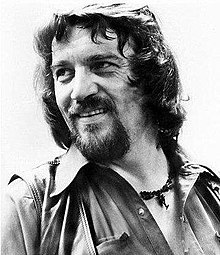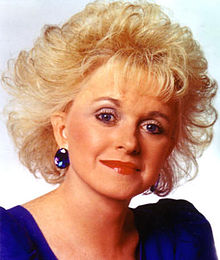Waylon sings Buddy's classic hit, an' I remember this being at the top of the British charts, just about the time I left school. If you don't already know, they were best friends and Waylon played bass in Buddy's band.
Jennings began playing guitar at eight and began performing at twelve on KVOW radio. He formed a band, The Texas Longhorns. Jennings worked as a D.J. on KVOW, KDAV, KYTI, and KLLL.
In 1958, Buddy Holly arranged Jennings's first recording session, of “Jole Blon” and “When Sin Stops (Love Begins).” Holly hired him to play bass. During the “Winter Dance Party Tour,” in Clear Lake, Iowa, Holly chartered a plane to arrive at the next venue.
Jennings gave up his seat in the plane to J. P. Richardson, who was suffering from a cold. The flight that carried Holly, Richardson, and Ritchie Valens crashed, on the day later known as The Day the Music Died.
Following the accident, Jennings worked as a D.J. in Coolidge, Arizona, and Phoenix. He formed a rockabilly club band, The Waylors. He recorded for independent label Trend Records, A&M Records before succeeding with RCA Victor after achieving creative control of his records.
During the 1970s, Jennings joined the Outlaw movement. He released critically acclaimed albums Lonesome, On'ry and Mean and Honky Tonk Heroes, followed by hit albums Dreaming My Dreams and Are You Ready for the Country.
In 1976 he released the album Wanted! The Outlaws with Willie Nelson, Tompall Glaser, and Jessi Colter, the first platinum country music album. The success of the album was followed by Ol' Waylon, and the hit song “Luckenbach, Texas (Back to the Basics of Love).”
By the early 1980s, Jennings was struggling with a cocaine addiction, which he quit in 1984. Later he joined the country supergroup The Highwaymen with Nelson, Kris Kristofferson, and Johnny Cash. During that period, Jennings released the successful album Will the Wolf Survive. He toured less after 1997, to spend more time with his family.
Between 1999 and 2001, his appearances were limited by health problems. On February 13, 2002, Jennings died from complications of diabetes. Jennings also appeared in movies and television series. He was the balladeer for The Dukes of Hazzard; he also composed and sang the show's theme song.
In 2001 he was inducted into the Country Music Hall of Fame, which he chose not to attend until later on. In 2007 he was posthumously awarded the Cliffie Stone Pioneer Award by the Academy of Country Music.
| Waylon Jennings | |
|---|---|
 |
|
| Background information | |
| Birth name | Wayland Arnold Jennings |
| Born | June 15, 1937 Littlefield, Texas, United States |
| Died | February 13, 2002 (aged 64) Chandler, Arizona, United States |
| Genres | Country, outlaw country, country rock, progressive country |
| Occupations | Singer-songwriter, musician |
| Instruments | Vocals, guitar, bass guitar, piano, mandolin |
| Years active | 1958–2002 |
| Labels | RCA Victor, MCA, Epic |
| Associated acts | Jessi Colter, Willie Nelson, The Highwaymen, Buddy Holly, Andy Griggs |
| Website | www.waylonjennings.com |
| Notable instruments | |
Fender Telecaster Signature of Waylon Jennings | |
Early life
Waylon Arnold Jennings was born in Littlefield, Texas, the seat of Lamb County, the son of Lorene Beatrice (née Shipley) and William Albert Jennings.[1]
His original birth name was Wayland, meaning land by the highway, but it was changed after a Baptist preacher visited Jennings's parents and congratulated his mother for naming him after the Wayland Baptist University in Plainview, Texas.
Lorene Jennings, who had been unaware of the college, changed the spelling to Waylon. Jennings later expressed in his autobiography, “I didn't like Waylon.
It sounded corny and hillbilly, but it's been good to me, and I'm pretty well at peace with it right now.”[2]
When Jennings was 8, his mother taught him to play guitar with the tune Thirty Pieces of Silver.
Jennings used to practice with the guitars of his relatives, until his mother bought him a used Stella, and later ordered a Harmony Patrician.[3]
Jennings never learned to read music, but he practiced in pursuit of a career in music and to avoid a possible future picking cotton and other temporary jobs.[4][5]
His original birth name was Wayland, meaning land by the highway, but it was changed after a Baptist preacher visited Jennings's parents and congratulated his mother for naming him after the Wayland Baptist University in Plainview, Texas.
Lorene Jennings, who had been unaware of the college, changed the spelling to Waylon. Jennings later expressed in his autobiography, “I didn't like Waylon.
It sounded corny and hillbilly, but it's been good to me, and I'm pretty well at peace with it right now.”[2]
When Jennings was 8, his mother taught him to play guitar with the tune Thirty Pieces of Silver.
Jennings used to practice with the guitars of his relatives, until his mother bought him a used Stella, and later ordered a Harmony Patrician.[3]
Jennings never learned to read music, but he practiced in pursuit of a career in music and to avoid a possible future picking cotton and other temporary jobs.[4][5]
Beginnings in music
The 12-year-old Jennings auditioned for a spot on KVOW in Littlefield, Texas. Owner J.B. McShan, along with Emil Macha, recorded Jennings's performance.
McShan liked his style and hired him for a weekly 30-minute program.
Following this successful introduction, Jennings formed his own band.
He asked Macha to play bass for him, and gathered other friends and acquaintances to form The Texas Longhorns.
The style of the band, a mixture of country and western and bluegrass, was often not well received.
At 17, Jennings and band recorded a demo of the songs “Stranger in My Home” and “There'll Be a New Day” at KFYO radio in Lubbock, Texas.[6]
In addition to performing on air for KVOW, Jennings later worked as a D.J. for the station.[7]
Jennings dropped out of high school in tenth grade to pursue music.
His early influences were Bob Wills, Floyd Tillman, Ernest Tubb, Hank Williams, Carl Smith and Elvis Presley.[8][9][10][11]
He moved to Lubbock, where he initially worked for KLLL, and later for KDAV; Jennings' show was successful in both venues.[7]
McShan liked his style and hired him for a weekly 30-minute program.
Following this successful introduction, Jennings formed his own band.
He asked Macha to play bass for him, and gathered other friends and acquaintances to form The Texas Longhorns.
The style of the band, a mixture of country and western and bluegrass, was often not well received.
At 17, Jennings and band recorded a demo of the songs “Stranger in My Home” and “There'll Be a New Day” at KFYO radio in Lubbock, Texas.[6]
In addition to performing on air for KVOW, Jennings later worked as a D.J. for the station.[7]
Jennings dropped out of high school in tenth grade to pursue music.
His early influences were Bob Wills, Floyd Tillman, Ernest Tubb, Hank Williams, Carl Smith and Elvis Presley.[8][9][10][11]
He moved to Lubbock, where he initially worked for KLLL, and later for KDAV; Jennings' show was successful in both venues.[7]
On September 10 Jennings recorded the songs “Jole Blon” and “When Sin Stops (Love Begins)” with Holly and Tommy Allsup on guitars with saxophonist King Curtis.
The single was released on Brunswick in 1959 with limited success. Holly then hired Jennings to play electric bass for him during his “Winter Dance Party Tour.”[7]
After a show in Clear Lake, Iowa, Holly chartered a plane for himself, Allsup, and Jennings to avoid a long bus trip to Fargo, North Dakota.
Allsup lost a coin toss to Ritchie Valens for his seat on the plane, while Jennings gave up his seat to J. P. Richardson, who was suffering from a cold and complaining about how uncomfortable a long bus trip was for a man of his size.[12]
Holly jokingly told Jennings, “I hope your ol' bus freezes up!” Jennings replied, “Well, I hope your ol' plane crashes!”[13]
During the early morning hours of February 3, 1959, later known as The Day the Music Died, the charter crashed outside Clear Lake, killing all on board.[14
Jennings and Allsup continued the tour for two more weeks, featuring Jennings as the lead singer.[7] Jennings later admitted that he felt severe guilt and responsibility for the crash.[15]
He later returned to KLLL and performed regionally, but eventually was fired by Sky Corbin. Subsequently, Jennings worked briefly for KDAV.[8]
He released recordings under Trend Records and experienced moderate success with his single, “Another Blue Day.”[16]
Source: Wikipedia.org
TTFN
CYA Later Taters!
Thanks for watching.
Donnie/ Sinbad the Sailor Man






